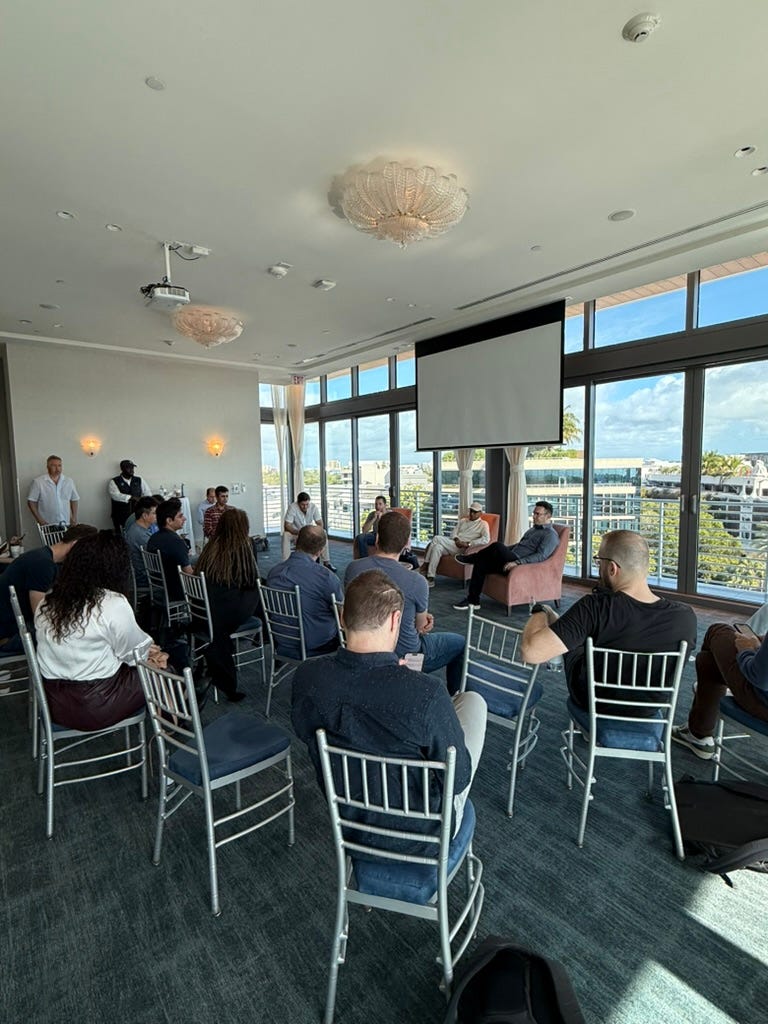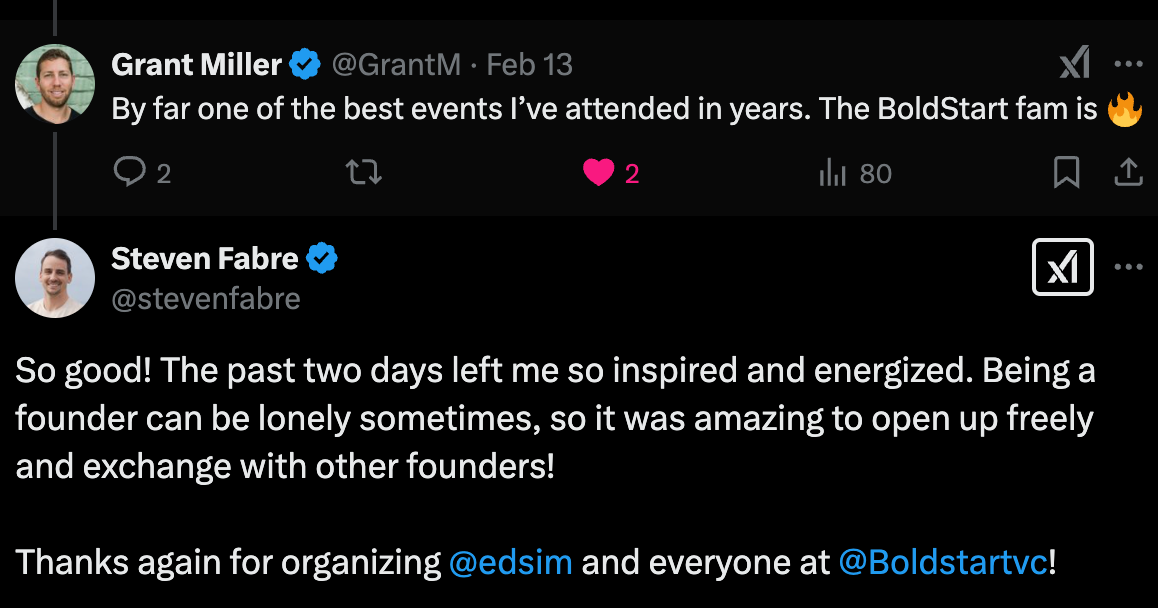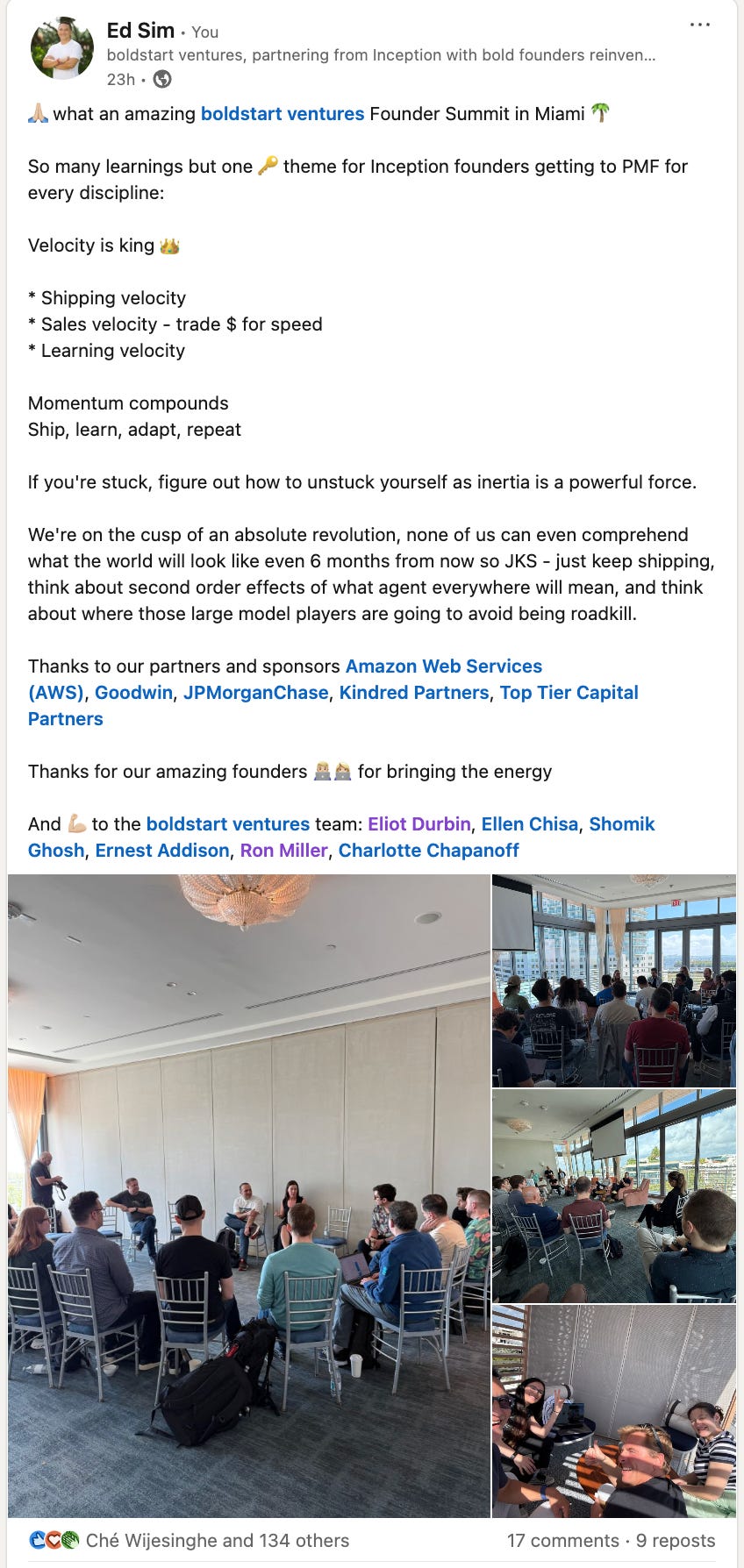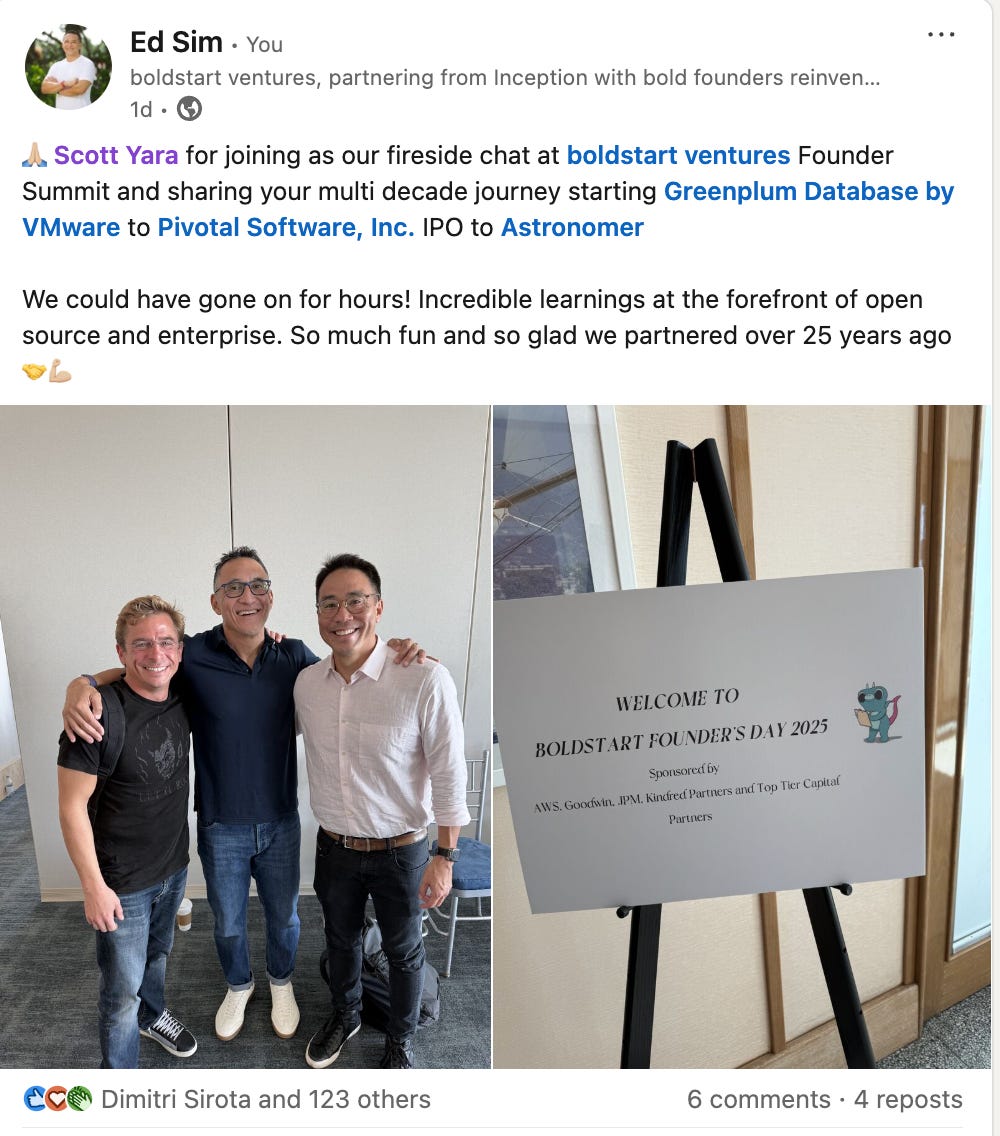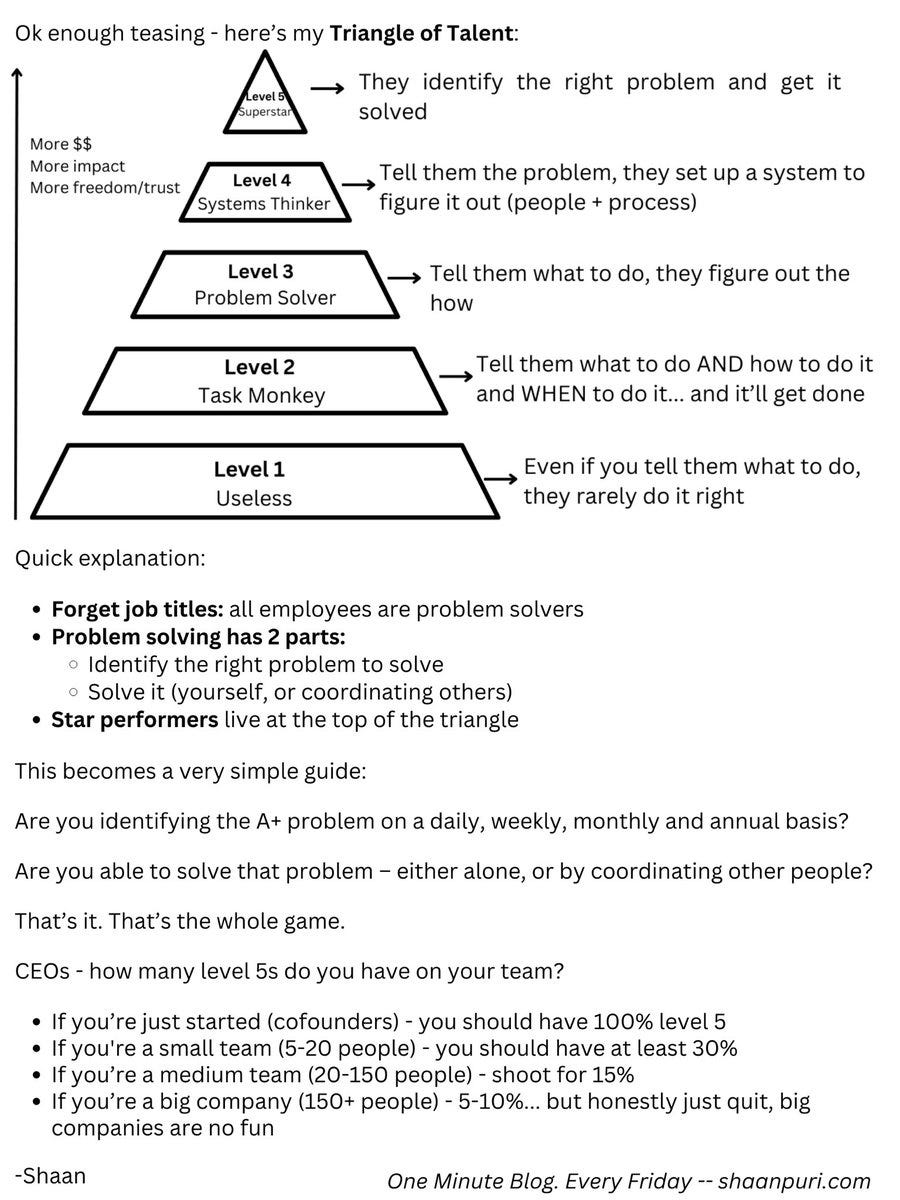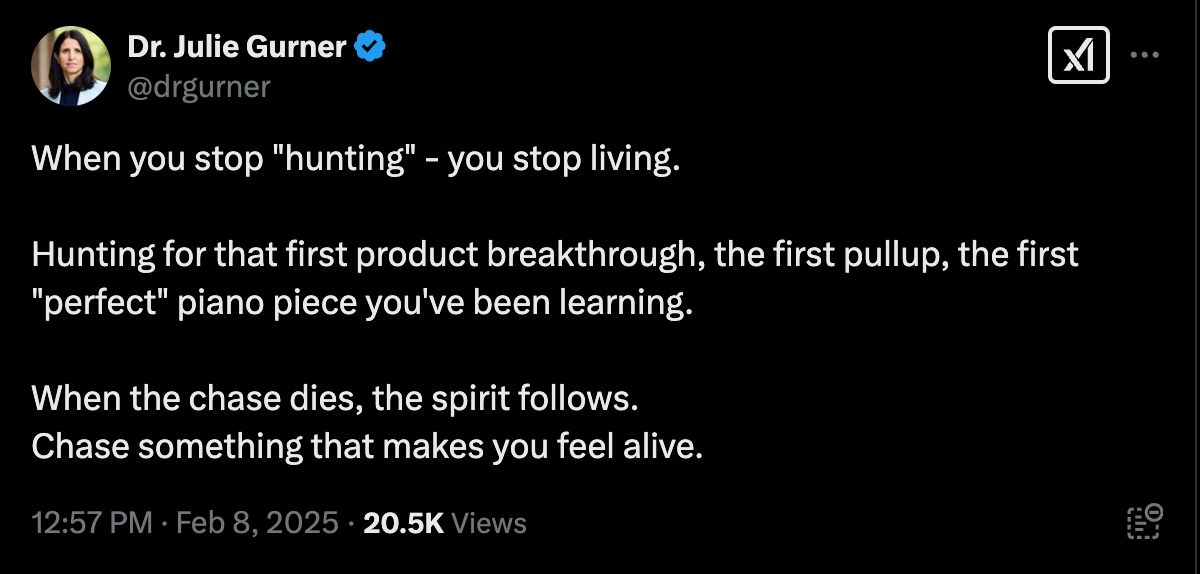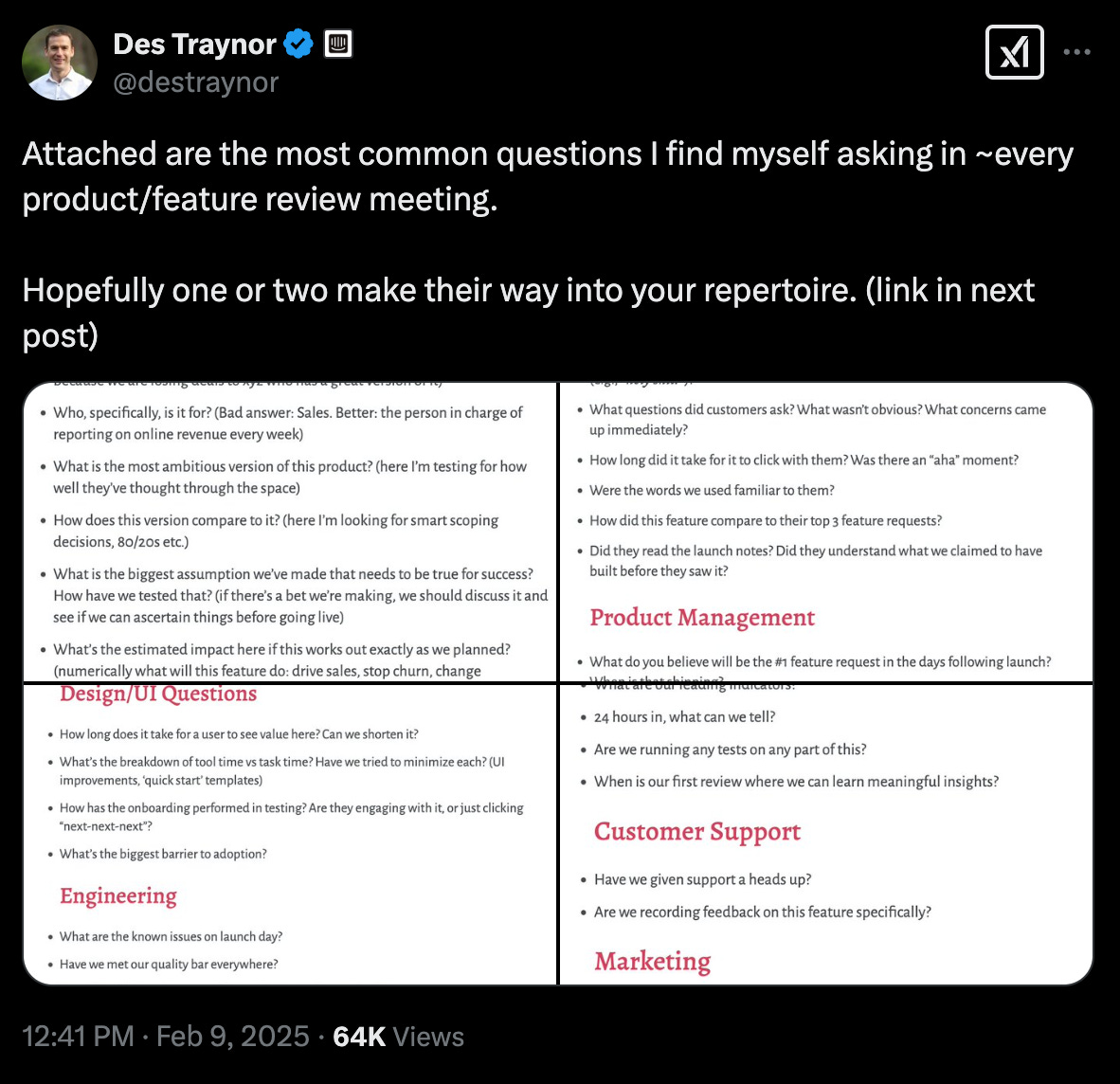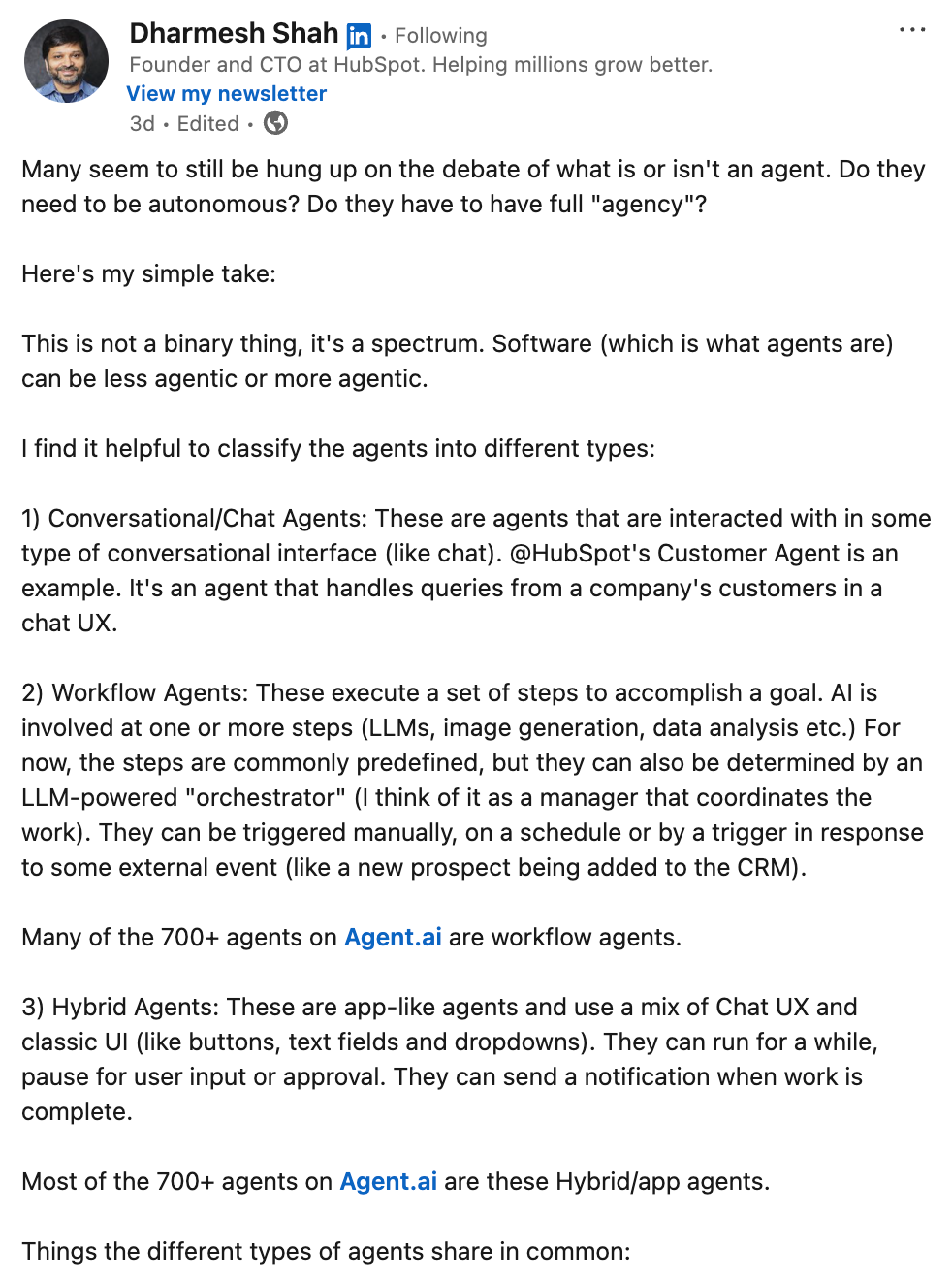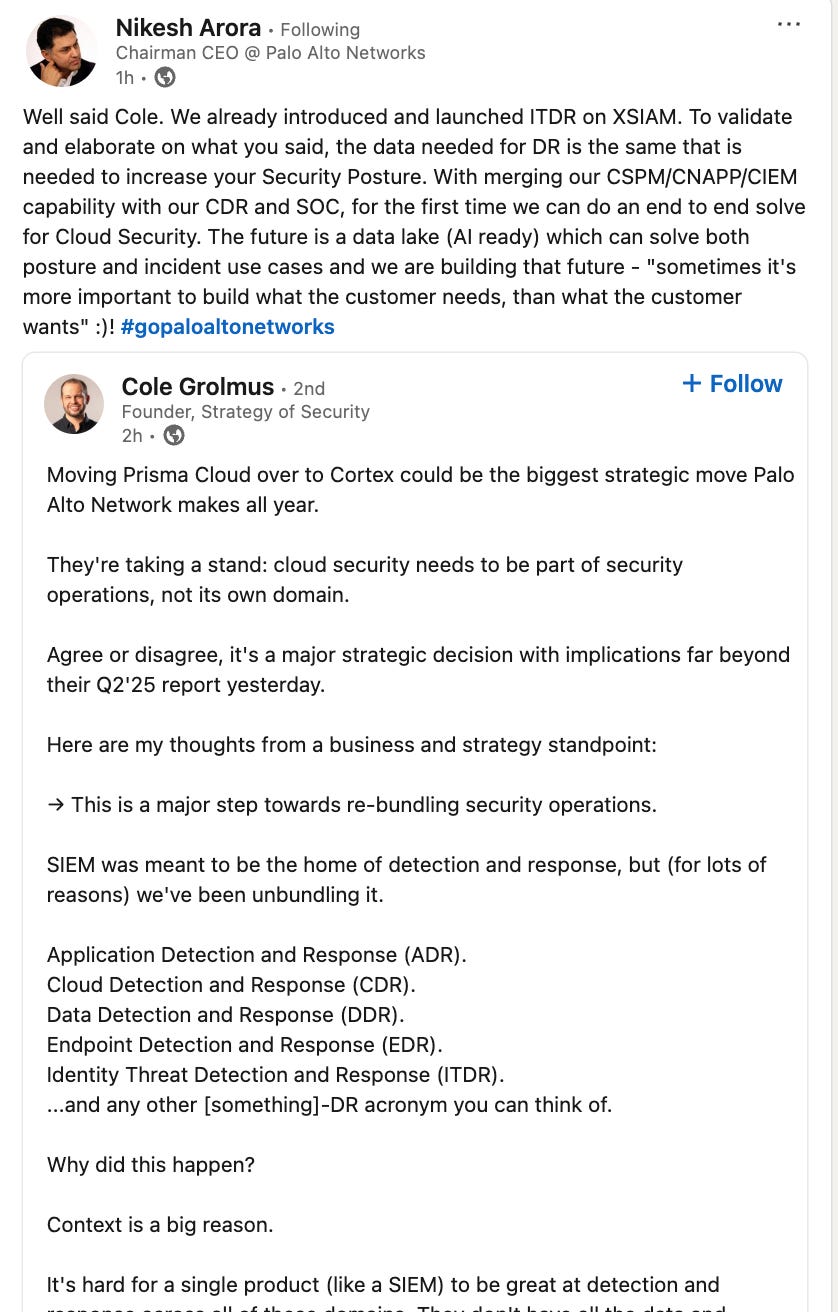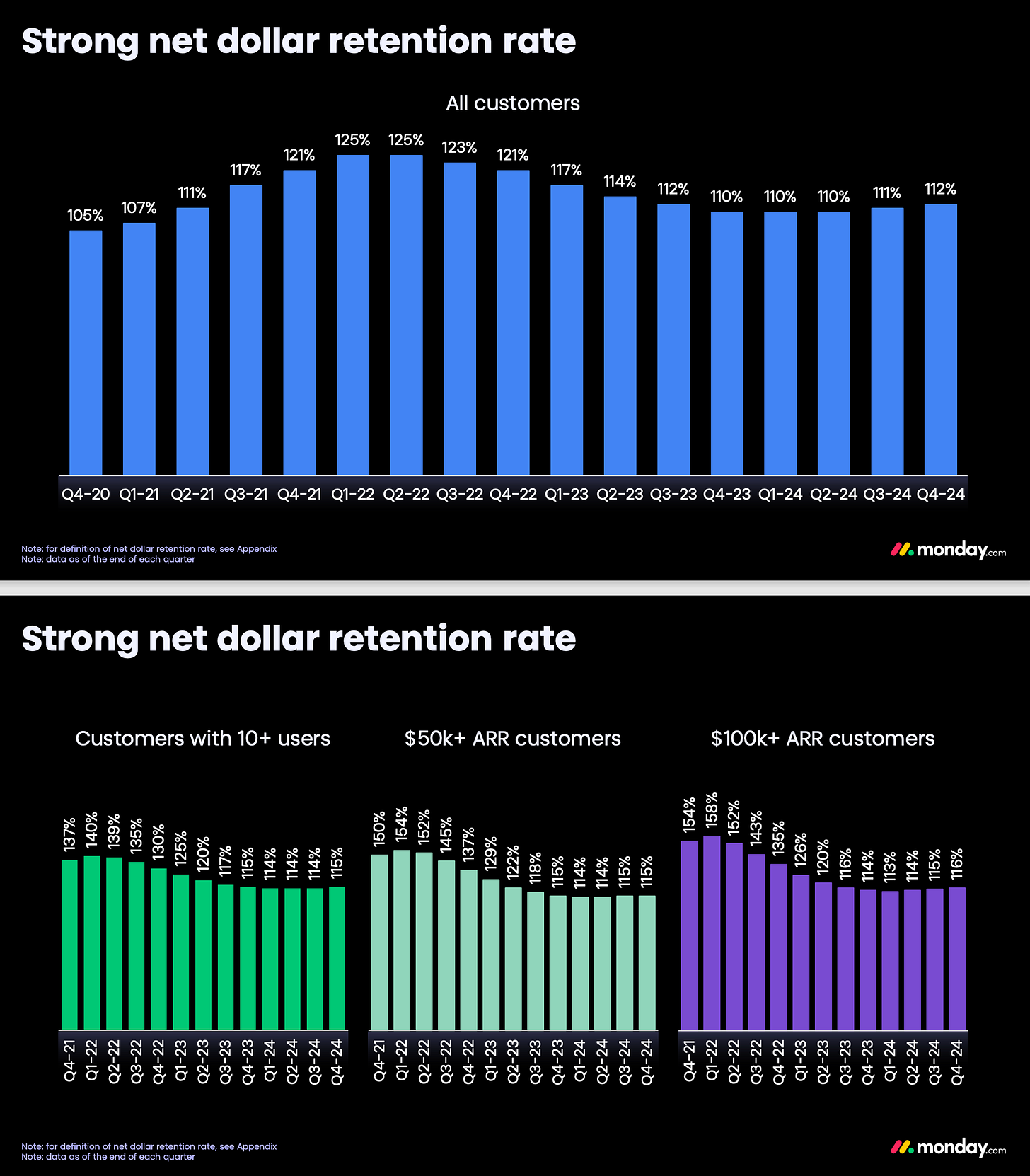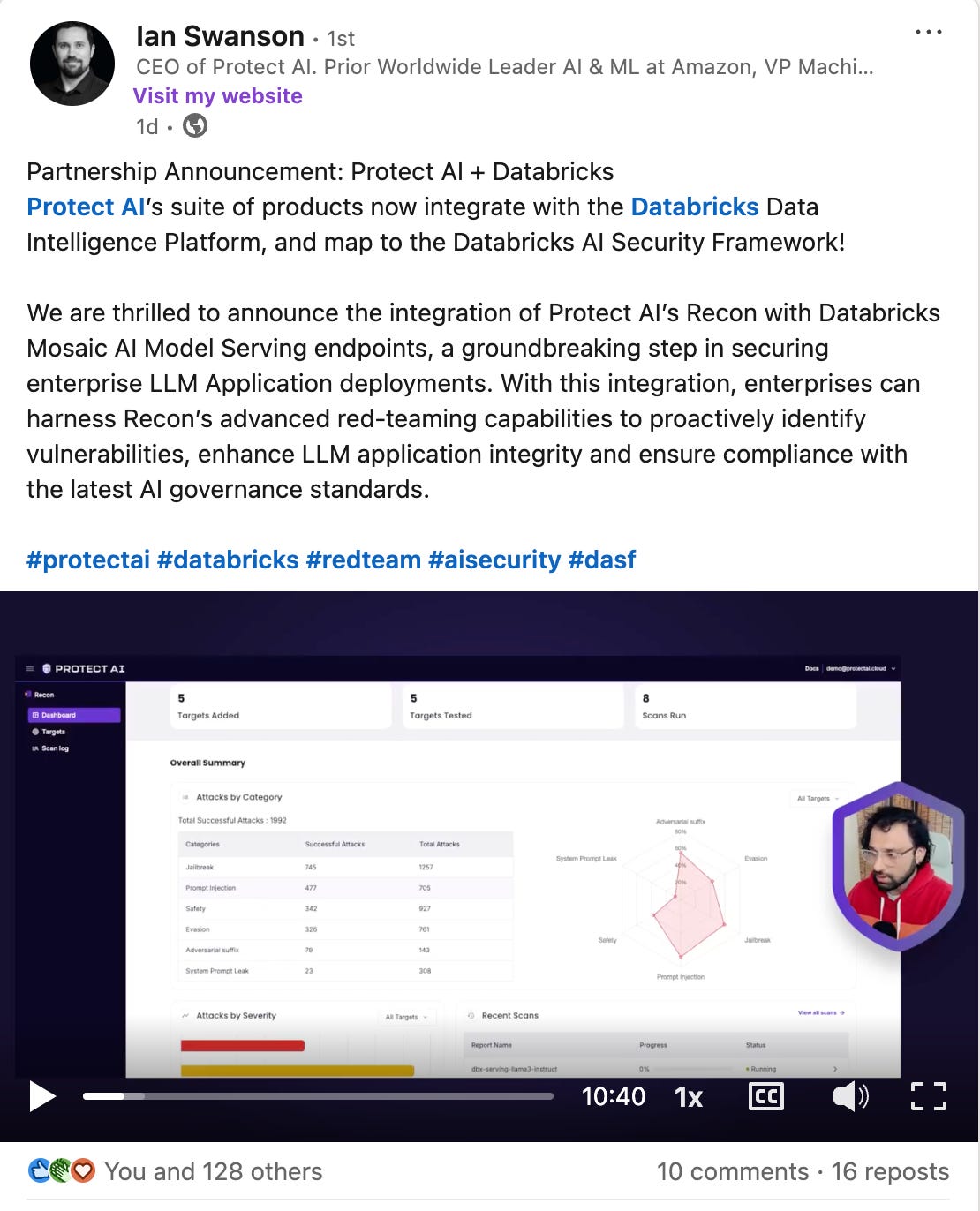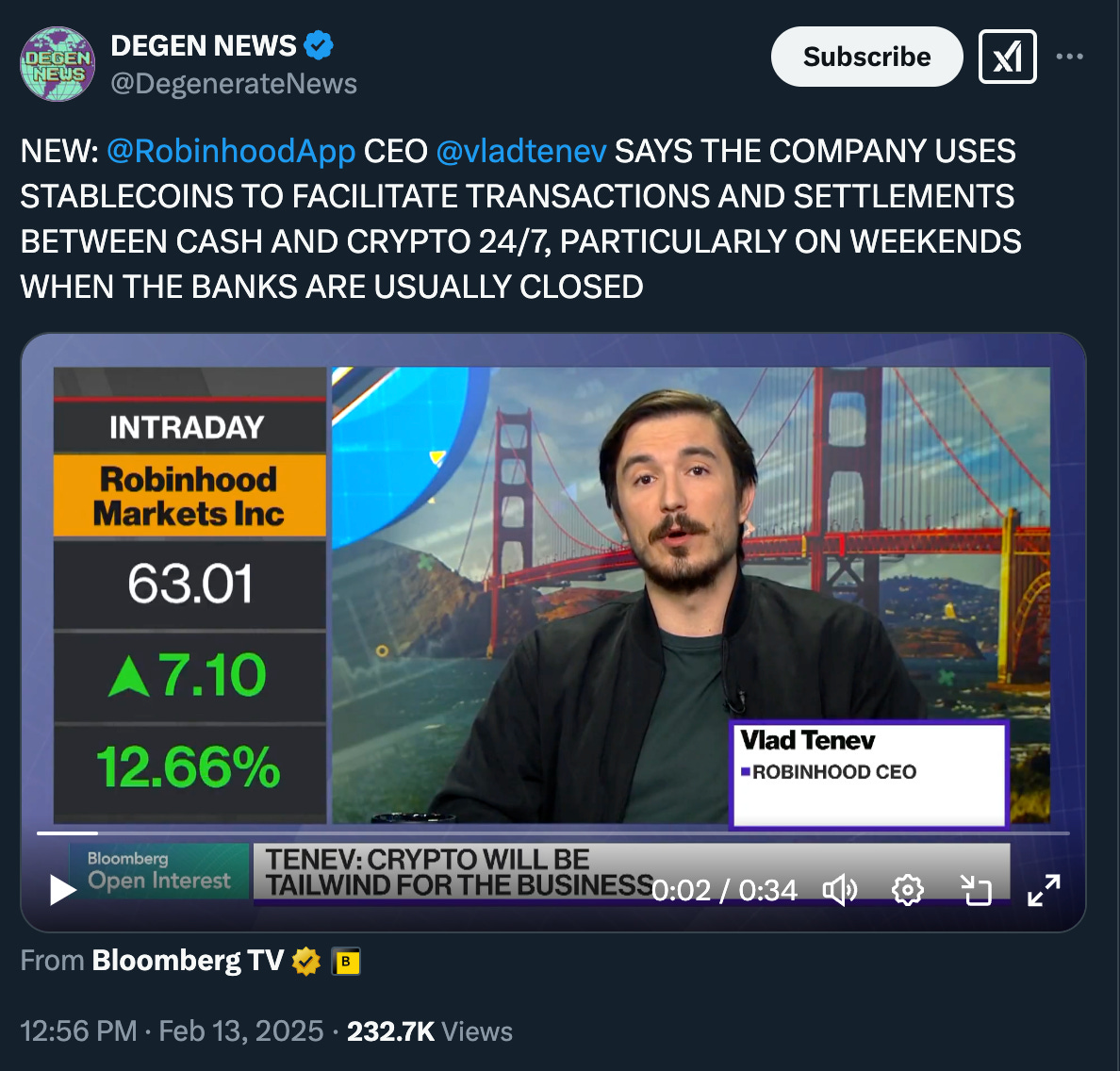What’s 🔥 in Enterprise IT/VC #433
boldstart technical founder summit - AI giveth and AI taketh away + other takeaways
What do you get when you mix a passionate group of technical enterprise nerds talking about AI and GTM together for a couple of days? 🤯 🔌
I’m still processing all of the discussions, side bars, and late evenings from our boldstart Founder Summit in Miami. All I can say, is if you’re an investor and haven’t organized one of these, then I suggest you do, as there is nothing better for founders than to just have the time to geek out with one another in a safe space and explore what’s new in the world. This equally applies for founders running companies >$100M ARR and for those just starting. Being a founder can be lonely and Steven and Grant sum it up well 👇🏼.
AI giveth and AI taketh away
AI giveth - there was an excitment and buzz this week as founder after founder had their laptops open showing their latest rev and iteration of their new, new thing which was, of course, mostly agentic and AI-powered. There was this feeling that no matter how big or small you are, there is always a chance to reach escape velocity 🚀 at any time if you build the right product with the right “wow” factor. The feeling that any one could be the next Bolt.new was inspirational. For those who don’t know, here’s the story 👇🏼
At the same time, no one is immune as AI can taketh away. It can taketh away PMF! There was this fear also of what happens when I’m already established and my competitors come for me with an AI-native stack with no technical debt. Yes, AI can equally taketh away so PMF has to be a recurring idea as it’s not a point in time like a balance sheet but a living, breathing thing that constantly needs to be fine tuned, evern more so in the world of AI where the moats to build are even lower.
AI Coding
One of the hottest topics was around the best tools for using AI in coding. As I walked around the room it was pretty cool to see both younger first time founders and older vets just banging away prototyping and coding and sharing best practices on coding with Cursor, Windsurf, Codebluff or all of the above. These founders have drunk the Kool-aid and everyone repeatedly told me what used to take hours only takes minutes now. Bolt.new was definitely another favorite among boldstart founders for rapid prototyping but not for production. There was also lots of discussion on whether we need Figma or not if one can easily speak in code and get what you want versus designing and turning into code. One founding team has a dedicated engineer on staff to just test every new coding product to figure out the best way to keep up and get more efficiency for the rest of the team.
Agents
Another interesting deep dive was around the Future of Agents led by Joao Moura, co-founder and CEO of CrewAI (one of our portfolio companies). If you’re wondering how enteprises are going to adopt agents Joao let the session know that >50% of the Fortune 500 already has a developer using the framework. We’re still in the early innings for enterprise adoption and much of the conversation shifted towards my favorite topic on second order effects when agents outnumber each human 1000 to 1 and the infrastructure one will need to think, build, see, host, manage, operationalize, secure, and scale these 😲!
As Joao heard in SF, the future will be the shift from B2B to B2A to A2A.
Once again, what kind of infra will be needed to support a world where agents are doing 90% of the work versus humans?
Data
Finally, many founders just emphasized the importance of data - foundational models are a commodity, but it’s the data that matters - how to create proprietary data or get that data creates a significant moat over time.
Bottom line - the world is moving so fast and none of us really know.
Recap - velocity, think bigger
It’s hard to synthesize all of the discussions and self organized talks, but here’s my best attempt.
👇🏼 from my partner Eliot Durbin:
Nadia from Codeyam:
Going back to my first point, it’s all about innovating and keeping up the velocity. ❤️ this from Patrick Collison of Stripe - “the tyranny of being first” which shows how hard it is for first movers to always stay ahead and how one must contanstly fight bloat (Fortune Term Sheet).
Building an Exothermic company - Scott Yara
Last but not least, one of the highlights of Founder Summit was having my long time friend and legend Scott Yara join us for a fireside chat on building software companies over 3 decades. We first met back in 1999 when I funded the company which would pivot multiple times to become Greenplum Software, a scalable data warehouse built on OSS PostgreSQL and commodity hardware which would later get sold to EMC of hundreds of millions of dollars and eventually spin out and IPO as Pivotal Software. Scott is now building companies at Sutter Hill Ventures with Mike Speiser who helped start Snowflake - so many 💎 from his talk…
Here are a couple enduring lessons Scott shared, best summarized by my Partner Ellen Chisa:
Build an exothermic company - revenue should be more than all the money you spent, employees should get more out of it than they put in.
If you ever let up or assume success is guaranteed, it's game over.
Run towards the best people you can find who will let you work with them. There's a reason that staging works well in restaurants. Being a line cook in the best restaurant teaches you what excellence looks like. If it's not time to build, go somewhere excellent.
Scott Yara, founder of Greenplum, sold to EMC, spun out as Pivotal Software, IPO, sold for $4B, now partner at Sutter Hill VenturesThere were plenty of other sessions which Ron Miller from our team will write more about in the next week.
Our checkbooks are open as we continue to seek bold, technical founders building on the fringes, the ones who are often misunderstood, creating the categories of tomorrow. We’d love to have you nerd out with the the broader boldstart community which is all enterprise focused but also encompasses deep technical builds on the frontier like robotics and bio and ???.
As always, 🙏🏼 for reading and please share with your friends and colleagues!
Scaling Startups
#Jamie Dimon on remote work - this is worth a listen
#underrated and forgotten many times - a technology in search of a problem vs. finding the right problem first
#thinkers + doers in one person…combing art and science, thinking and doing = exceptional results
#speaking of identifying the right problem and solution - you want to surround yourself with as many Level 5 performers as possible - more here (Shaan Puri)
#💯
#I’ve invested in Marten Mickos’ companies in the past and this series on being a founder is one I encourage you to read and subscribe to (founder/CEO of MySql sold for over $1B, Eucalyptus (sold to HPE), CEO of HackerOne…
There are three fundamental (and fixable) founder weaknesses that show up at the early stage of startup life:
Delusion, meaning believing in impossible things and hoping things will play out well.
Amateurishness, meaning insufficient skills and not setting the bar high enough.
Confusion, meaning an inability to see what's essential and what isn't.
These three weaknesses sound like terrible human flaws, but they are not. They exist for a reason. Startup founders must believe in things others are not seeing, so having overconfidence is not a bad thing. But delusion is. You must learn to moderate this optimism of yours. It's good to believe in great outcomes, but you better be a paranoid optimist - one who can confront the possibility of being wrong.#💯
Enterprise Tech
#🤯 many of our founders still can’t get access to enough GPUs at many cloud providers…
#👇🏼 every builder should read this - great framework on why are you building it and how from Des at Intercom
#what is an agent? Dharmesh from Hubspot takes a crack which is pretty darn good…
#from Sam Altman - three observations
We continue to see rapid progress with AI development. Here are three observations about the economics of AI:
1. The intelligence of an AI model roughly equals the log of the resources used to train and run it. These resources are chiefly training compute, data, and inference compute. It appears that you can spend arbitrary amounts of money and get continuous and predictable gains; the scaling laws that predict this are accurate over many orders of magnitude.
2. The cost to use a given level of AI falls about 10x every 12 months, and lower prices lead to much more use. You can see this in the token cost from GPT-4 in early 2023 to GPT-4o in mid-2024, where the price per token dropped about 150x in that time period. Moore’s law changed the world at 2x every 18 months; this is unbelievably stronger.
3. The socioeconomic value of linearly increasing intelligence is super-exponential in nature. A consequence of this is that we see no reason for exponentially increasing investment to stop in the near future.
If these three observations continue to hold true, the impacts on society will be significant...
Anyone in 2035 should be able to marshall the intellectual capacity equivalent to everyone in 2025; everyone should have access to unlimited genius to direct however they can imagine. There is a great deal of talent right now without the resources to fully express itself, and if we change that, the resulting creative output of the world will lead to tremendous benefits for us all.#Workday taking a crack at creating the system of record for agents in an enterprise with all the bells and whistles one can assume…(TechCrunch)
Silicon Valley-based Workday announced on Tuesday the release of Workday Agent System of Record, which is meant to help customers keep track of their AI agents in one control center, regardless of whether the agent is managed by Workday or by a third party.
This system gives companies visibility into what all of their agents are supposed to be doing, which tasks they are actually completing, and who at the company has access to which agents. The software tracks the impact of each AI agent and projected costs. Companies can also use the platform to turn agents on and off entirely or turn certain skills or tasks on or off.
Workday CEO Carl Eschenbach said on a press briefing that as AI agents become an increasing part of an enterprise company’s workflow, companies should have a way to manage them just like people. “The workforce is expanding,” Eschenbach said. “It’s no longer just human workers, it’s now digital workers, and we need to have a unified platform that manages your entire workforce going forward.”
“A lot of people talk about agents, but these agents today are doing a task. They’re just doing something that is repetitive and making it faster,” Eschenbach added. “The true power of agents is when they become role based, and these role-based agents will maybe start out with a skill, but they will, over time, have many skills, and this is how we will truly unlock the power of AI.”#super active discussion last weekend - yes, meant to be sensationalist and probably right for basic apps but question is how far it can go for more complex apps and teams - my two cents, still so much time…
#Checkpoint makes unusual move partnering with Wiz…question is if this is truly a win/win or another step towards Wiz crushing a partner (CTech). Will be interesting to see what else Check Point decides is core/non-core as it goes through a strategic review process with its new CEO
The deal, which integrates Check Point’s cloud network security with Wiz’s Cloud Native Application Protection (CNAPP) platform, is positioned as a win-win: Check Point gains access to Wiz’s cutting-edge cloud security tools, while Wiz benefits from Check Point’s vast customer base. The collaboration is aimed at providing a more comprehensive security solution in an industry where Palo Alto Networks, led by Israeli Nir Zuk, has become the dominant player.#big moves at Palo Alto Networks - like Benioff, it’s all about the data - “the future is a data lake (AI ready) which can solve both posture and incident use cases and we are building that future” - Cole chimes in “They're taking a stand: cloud security needs to be part of security operations, not its own domain.” click 👇🏼 for more
#the new bar for best in class Net $ Retention - Monday.com, down from 154% for customers >$50k to 115% 🤯
Powered by simply insane growth and execution driving the stock up 29% after earnings.
#There is no AI at scale in the enterprise without AI security - 🔥 up for this partnership from Protect AI (a portfolio co) and Databricks - watch how easy and important
#your prompt is now a reusable program to trigger a workflow 🤯 (from dylibo.so a portfolio co)
#real use cases for crypto - wait till the financial institutions start tokenizing real world assets
Markets
#agree or disagree? IMO, all model providers have to offer several applications and monetize as the underlying model gets commoditized or DeepSeeked
#all about scale to IPO - Harness, dev ops platform, merges with Traceable to go after DevSecOps space - Harness annoucned early last year that it crossed the $100M ARR mark, now this gives them opportunity to go for it faster (from Jyoti founder of Harness) - also unusual that Jyoti was running both companies for awhile! (CNBC). FWIW I do expect to see much more of this but the complications will come from what valuation to use on both sides, preference stacks, etc which can kill deals. In this case having Jyoti who ran both companies makes it a bit easier.
Today, I have exciting news: our two companies Harness and Traceable are merging to form a brand new leader in DevSecOps, bringing software delivery and application security together in one unified platform...
And this is just the start of our journey, not the end. We’re on a mission to fundamentally change the software delivery landscape. The merged business brings substantial momentum. With ARR north of $250 million projected this year — growing more than 50% year-over-year — it’s one of the fastest-growing private companies of its size. This move accelerates our march to $1 billion in ARR as the consummate platform for software delivery.
